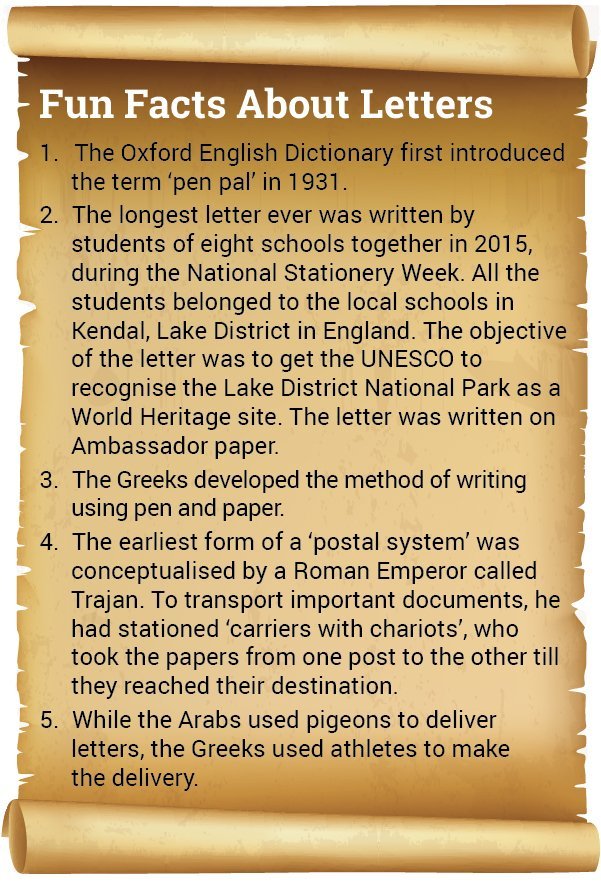
Why Writing Letters Is Still Important Today. Here’s What Your Child Can Learn From It
We tell you why the art of letter writing is still relevant in this digital age and in what ways it benefits your child
“How wonderful it is to be able to write someone a letter! To feel like conveying your thoughts to a person, to sit at your desk and pick up a pen, to put your thoughts into words like this is truly marvelous.” Haruki Murakami (Norwegian Wood)
The first recorded letter written by hand was by the Persian Queen Atossa around 500 BC. Little did she know that she was starting a trend that would be followed by generations after her, and this simple activity would turn into an art as well as a tool for change.
Letters have been an integral part of communication for centuries. Famous personalities and commoners alike put pen to paper and poured their hearts out. Parents wrote long letters about life to their children, revolutionaries inspired millions through words scribbled on torn pieces of paper and spies ferreted out little notes holding valuable pieces of information. For a long time, the world depended on letters for information.
But, with the advent of technology in the form of e-mails and text messages, letter writing has been reduced to just an art form that few with a fancy indulge in.
This brings up the question, ‘In this digital age, do our children need to know how to write a letter at all?’ The answer is Yes, and we give you a few good reasons.
Relevance of letter writing today
Here are some ways in which letters still hold value in this digital age
- For documentation: Letters are a good way to document and record important events, and information. They may also act as proof, which can hold good in a court of law.
- For getting instant attention: A handwritten letter is guaranteed to get instant attention rather than the numerous mails that keep popping in our inbox. A handwritten letter says that you care and are willing to give personal attention to the matter or the person addressed.
- For official communication: Official letters of communication are still used in many organizations. While a majority of them are printed, writing a letter detailing an action plan or a procedure adds a certain authority to the communication.
How your child can benefit from letter writing
Makes your child a better learner: When your child sits down to write a letter, he needs to focus. Unlike sending short text messages or e-mails, writing a letter requires undivided attention. Hence, it helps in processing information better. Mueller and Oppenheimer published a study titled, ‘The Pen Is Mightier Than the Keyboard: Advantages of Longhand Over Laptop Note Taking’, in the journal Psychological Science (2014). They found that students who took notes by hand performed better in tests than those who typed notes on a laptop. They stated, ‘The present research suggests that even when laptops are used solely to take notes, they may still be impairing learning because their use results in shallower processing. In three studies, we found that students who took notes on laptops performed worse on conceptual questions than students who took notes longhand.
Improves handwriting: There’s no doubt that practice makes for better penmanship. And, letter writing gives your child enough scope to do just that. Writing letters can also be a good way to help him become familiar with the concept of cursive writing.
Strengthens language skills: Unlike typing on a smartphone or computer, where words can easily be erased or rephrased, writing on paper is almost permanent. So, your child would need to think about what she is writing – the words she plans to use to put her thoughts on paper. This activity will encourage her to think more and look up words and phrases that’ll help her express herself better.
Helps in creative expression: Talking about expression, letter writing is one sure way of making your child think more creatively. For example, how best can she describe her first trip to the beach? Writing it all down in a letter requires time and focus. This makes the brain think creatively. So, trying to put words on paper can inspire your child’s creative expression.
Children are eager learners and can develop their writing skills in a number of ways. You can help your children when they first learn to write by talking to them about the ideas they are writing. This helps build their comprehension skills and engage more fully with what they are writing. Over time, and with regular practice, your children will develop fluency in writing and learn to think more deeply about the stories or information they write. ? Ponnuri Gopiikrishna, Handwriting Expert, Founder, Sree Bhagavathi Yoga Trust, Vijayawada










